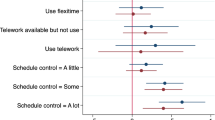Abstract
Many believe that regulation of working hours is necessary to protect the welfare and health of employees. In Japan, employers cannot make employees work for more than 8 hours per day, or 40 hours per week. However, many in the business community claim that these regulations are not appropriate in the modern Japanese economy, in which the proportion of tertiary industry, such as the IT industry, is growing. Hence, they advocate the implementation of a “white-collar exemption” in Japan. Others argue that elimination of these regulations would increase working hours and allow unpaid overtime. This study uses micro data from Rengo Seikatsu Anketo Chousa, 2008 to study the effects of a white-collar exemption on working hours. Even though a white-collar exemption has not yet been introduced in Japan, discretionary work already seems to be underway, as if such an exemption were already in place. The results of this study indicate that discretionary work increases overtime working hours, while the management of working hours decreases overtime working hours.
Similar content being viewed by others
References
Altonji, J. G. and C. H. Paxson (1986) “Job Characteristics and Hours of Work,” Research in Labor Economics 8: 1–55.
Alesina, A., E. Glaeser and B. Sacerdore (2005) “Work and Leisure in the United States and Europe: Why So Different?” NBER Macroeconomics Annual 20: 1–64.
Blanchard, O. (2004) “The Economic Future of Europe,” The Journal of Economic Perspectives 18.4: 3–26.
Bryan, M. L. (2007) “Workers, Workplaces and Working Hours,” British Journal of Industrial Relations 45.4: 735–759.
Ishige, A. (2005) “A Study on White-Collar Exemption (in Japanese),” Waseda Business Review 38: 23–39.
Kanbayashi, R. (2010) “1980 nendai ikou no Nippon no Roudou Jikan (in Japanese),” in Y. Higuchi (ed.) Roudou Shijou to Shotoku Bunpai, pp. 159–197.
Kojima, N. (2004) “Howaito Kara no Roudou Jikan Seido: Amerika no Tekiyou Jogai Seido wo Chushin ni (in Japanese),” The World Labour 54.10: 24–31.
Kuroda, S. and I. Yamamoto (2009) “White-collar Exemption to Roudou Sha no Hataraki Kata: Roudou Jikan Kisei ga Roudou Jikan ya Chingin ni Ataeru Eikyou (in Japanese),” REITI Discussion Paper Series, 09-J-021.
Hamaguchi, K. (2009) Atarashii Roudou Shakai (in Japanese), Iwanami Shinsho.
Hayashi, K. (2004) “Roudou Hou no Kisei Kanwa Ron kara Mita Sairyou Roudou Sei no Sai Kentou (in Japanese),” Kikan Roudou Hou 207: 64–74.
Hisamoto, N. (2010) Social Policy in Japan (in Japanese), Nakanishiya Press.
Mitani, N. (2011) “Roudou Kyoukyuu no Kouzou Henka to Roudou Jikan (in Japanese),” in N. Mitani (ed.) Roudou Kyoukyuu no Keiai Gaku, Minerva Shobo, pp. 27–66.
Mori, S. (1997) “Henkei Roudou Jikan Sei and Sairyou Roudou Jikan Sei (in Japanese),” Kikan Roudou Hou 183: 21–36.
Prescott, E. (2004) “Why Do the USAns Work So Much More than Europeans?” Federal Reserve Bank of Minneapolis Quarterly Review 28.1: 2–13.
Shimada, Y. (2003) “Howaitokara no Roudou Jikan Seido no Arikata (in Japanese),” The Monthly Journal of the Japan Institute of Labour 519: 4–15.
Shimada, Y. (2005) “Howaitokara Eguzenpushon ni tsuite Kangaeru: Beikoku no Roudou Jikan Housei no Rinen to Genjitsu (in Japanese),” Bijinesu Reiba Torendo Kenkyuu Kai Houkokusho.
Shimizu, K. (2010) Roudou Jikan no Seiji Keizai Gaku (in Japanese), Nagoya University Press.
Sugano, K. (2004) Shin-Employment System and Labor Law (in Japanese), Yuhikaku Publishing.
Suzuki, H. (1986) “Oubei no Roudou Jikan Tanshuku no Doukou to sono Youin (in Japanese),” Nippon Roudou Kyoukai Zasshi 28.12: 29–38.
The Japan Institute for Labor Policy and Training (JILPT) (2006) “Shogaikoku no Howaitokara Roudousha ni Kakawaru Roudou Jikan Housei ni Kansuru Chousa Kenkyuu (in Japanese),” Roudou Seisaku Kenkyuu Houkokusho 36.
Author information
Authors and Affiliations
About this article
Cite this article
Fukuda, J. The Effects of Working Hours Schemes on Overtime Working Hours in Japan. Evolut Inst Econ Rev 9, 169–181 (2012). https://doi.org/10.14441/eier.A2012007
Published:
Issue Date:
DOI: https://doi.org/10.14441/eier.A2012007



